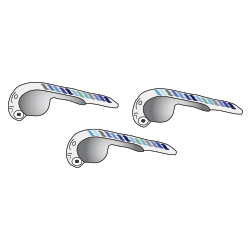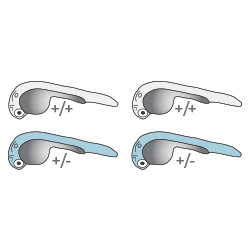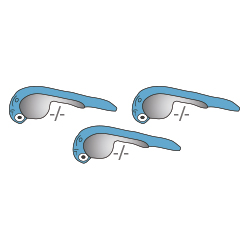ZeGenesis: Customized Zebrafish Gene Editing Services

ZeGenesis platform is the most up-to-date genetic toolbox for highly efficient mutagenesis, transgenesis, and gene expression modulation in zebrafish. We are CRISPR gene editing experts, officially licensed under the Broad Institute of MIT/Harvard, and specialists in Tol2 and other genome editing tools.
Using these advanced gene editing technologies, we can generate custom zebrafish transgenic, and knockout lines. We can also transiently modify gene expression according to your experimental needs.
Let's work together.
Get a head start on your next zebrafish model project by scheduling a call with one of our scientific consultants.
Scientific purposes
We design and contruct genetically edited zebrafish, which represents an incredible tool for in vivo testing & early drug discovery. The final aim of these approaches can be:
Understanding gene function in the developing or adult zebrafish, by finding what phenotypes arise from particular gene editions.
Our customized zebrafish genome editing solutions help you to faithfully establish human disease models.
In vivo validation of candidate genes in the context of a disease, for druggable target identification and subsequent drug design.
In vivo efficacy testing of candidate therapeutic compounds in the context of a disease, to accelerate your compound development.
Genetically modified zebrafish can also be valuable tools to study biological processes. We can establish tissue- and time-specific reporter lines to study organism development, morphology, and function. Transcriptional reporters allow monitoring the evolution of a biological process.
Why zebrafish?
It is a fully sequenced vertebrate.
It shares 82% of human disease-related genes.
It has a high number of genes (41,154) and number of protein coding (26,373 vs 22,493 in mouse).
It is amenable to genetic manipulation, including reverse genetic approaches.
CRISPR-Cas9 system has proven to be a highly specific, highly efficient and reliable approach for genome editing in zebrafish.
Zebrafish embryos allow high-throughput screening of pathological phenotypes in a whole-living animal.
The use of genetically modified zebrafish has already allowed the identification of new putative therapeutic drugs.
How to choose our services?
Our experts will give you the advice to select the best genetic approach according to your needs. Our goal is to assist you in moving forward with your experiments and shorten the period between project conception and completion.
I am new to zebrafish and gene editing
I am not sure what I want
- I have an experimental idea but am unsure how to start.
- I know the data I want to collect but am unsure what tool to use.
- I'd like to speak with an expert.
I know the gene editing I want, but need help
I want to outsource it
Due to a lack of:
- Technical expertise
- Equipment
- Zebrafish facility
- Sufficient knowledge of zebrafish genetics
I am an expert in zebrafish gene editing
Types of edits
Transgenesis and CRISPR gene editing
Stable genome editing approaches for loss-of-function mutagenesis and random or target insertion of exogenous DNA. You can choose from:
Transient Knock-down and overexpression approaches
Alternative more rapid approaches to evaluate the effect of gene loss-of-function or gene overexpression at early developmental stages. To this end, we provide you with different solutions:
Service packages
We offer a variety of service packages to fit the needs and budget of your lab. Our offerings can be fully customized, enabling you to adapt the assistance you require to achieve your gene editing goals.
Deliverables

F0 MOSAIC KNOCKOUT
We create and accurately validate your custom injection mix and deliver expertly injected embryos ready to submit to your nursery.

F1 ISOGENIC KNOCKOUT
It includes the entire process of design, sequence full validation, injection, rearing, germline screening, and line propagation up to F1 generation to deliver stable transgenic and knockout zebrafish lines.

F2 & F3 ISOGENIC KNOCKOUT
It includes the entire process of design, sequence full validation, injection, rearing, germline screening, and line propagation up to F2 or F3 generation to deliver stable transgenic and knockout zebrafish lines.
*In order to receive our genetically modified zebrafish embryos, facilities for zebrafish growth, maintenance, and crossing are needed.
Phenotypic assessments
In combination with our ZeEfficacy platform, zebrafish genetic models can be phenotypically characterized or used for compound screening. Thereby, we offer:
FAST phenotyping of your genetically modified zebrafish
Fast-track choice for reverse genetics. We create and accurately validate your custom injection mix, and phenotypically characterize somatic F0 mutants.
FINE characterization of your Zebrafish Genetic Model
End-to-end reverse genetic studies. We phenotypically characterize your transgenic, knock-out and knock-in zebrafish lines.
Drug screening in a disease context
We use your custom genetically edited zebrafish for efficacy screening of candidate therapeutic compounds.
We'd like to hear from you
If you want more information about our genetic
services or have any other questions, please
contact our experts.
References
- Suster ML, Kikuta H, Urasaki A, Asakawa K, Kawakami K. Transgenesis in zebrafish with the tol2 transposon system. Methods Mol Biol. 2009;561:41-63.
- Kawakami K, Asakawa K, Muto A, Wada H. Tol2-mediated transgenesis, gene trapping, enhancer trapping, and Gal4-UAS system. Methods Cell Biol. 2016;135:19-37.
- Pakula A, Lek A, Widrick J, Mitsuhashi H, Bugda Gwilt KM, Gupta VA, Rahimov F, Criscione J, Zhang Y, Gibbs D, Murphy Q, Manglik A, Mead L, Kunkel L. Transgenic zebrafish model of DUX4 misexpression reveals a developmental role in FSHD pathogenesis. Hum Mol Genet. 2019 Jan 15;28(2):320-331.
- Sung YH, Kim JM, Kim HT, Lee J, Jeon J, Jin Y, Choi JH, Ban YH, Ha SJ, Kim CH, Lee HW, Kim JS. Highly efficient gene knockout in mice and zebrafish with RNA-guided endonucleases. Genome Res. 2014 Jan;24(1):125-31.